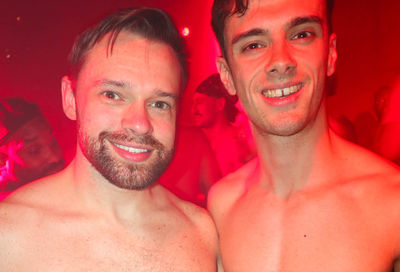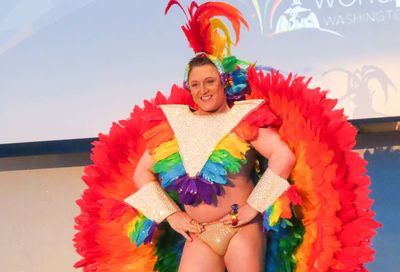Polling Gives Maryland Marriage Equality an Edge
Question 6 is ahead, but proponents are bracing for increased opposition
Maryland voters are on track to approve Question 6, a November ballot measure that would allow gay and lesbian couples to obtain civil marriage licenses, according to three September polls.
The polls – conducted by The Mellman Group, Gonzales Research and Marketing Strategies, and, on behalf of The Baltimore Sun, OpinionWorks – show varying degrees of support for marriage equality, though all show marriage-equality leading.
”The polls continue to show Marylanders believe in treating everyone fairly and equally under the law,” said Josh Levin, campaign manager for Marylanders for Marriage Equality, the coalition of labor, religious and community groups seeking to uphold Maryland’s marriage-equality law, the Civil Marriage Protection Act, by approving Question 6.
”We can feel the momentum for Question 6, but take nothing for granted,” Levin said in a statement. ”Polls will tighten in the final weeks, so this remains a very close race.”
The Sun poll surveyed 804 likely voters from Sept. 25 to 27, asking them: ”This spring, the General Assembly passed and the Governor signed a law to make same-sex marriage legal in Maryland. Opponents of the law have gathered signatures to place it on the ballot this November for the people to decide. In November, will you vote to make same-sex marriage legal or illegal in Maryland?”
The poll found that 49 percent of likely voters in Maryland said they would vote to make same-sex marriage legal, while 39 percent would vote to make it illegal, up from a 40-43 deficit in March. The poll’s margin of error is 3.5 percent.
While the Sun‘s write-up of its poll provided some general information illustrating support among certain groups based on race, party affiliation and gender, the paper did not provide crosstabs, meaning a breakdown of demographic sub-groups.
According to the Sun, more than half of African-American voters support making same-sex marriage legal, with a quarter opposed, marking a ”dramatic” and ”profound” shift among black voters compared to a similar Sun poll from March that found fewer than a third of African-Americans supported same-sex marriage.
The Sun poll found the lowest amount of overall support for marriage equality of the three polls. But Gonzales Research and the Mellman Group specifically asked people questions quoting the language that will appear on the ballot Nov. 6.
The Gonzales poll, conducted Sept. 17 to 23, asked 813 registered voters in Maryland the following question: ”Question Six is a referendum that allows gay and lesbian couples to obtain a civil marriage license; protects clergy from having to perform any particular marriage ceremony in violation of their religious beliefs; and affirms that each religious faith has exclusive control over its own theological doctrine regarding who may marry within that faith. If the election were held today, would you vote for this referendum or against this referendum?”
In response to that question, 51 percent of registered voters said they would vote for the referendum, while 43 percent said they would vote against it, up from a slimmer 49-47 margin in favor of marriage equality in a January poll. The poll’s margin of error is 3.5 percent.
The Gonzales poll found a shift in African-American attitudes similar to that in the Sun poll, with support growing by 11 points from 33 percent to 44 percent since January. But Gonzales also found that 52 percent of African-Americans would still vote against the referendum, contradicting the Sun‘s poll.
The Mellman Group poll, conducted Sept. 22 to 28, found that 54 percent of voters would support Question 6, while 30 percent would vote against it.
Steve Raabe, the chief pollster for OpinionWorks, which conducted the Sun poll, told Metro Weekly that he was surprised by the margin of support for the marriage equality law. But he cautioned that support for marriage equality might not be as strong as it appears, noting that his poll dealt with likely voters, not registered voters. He also said that reading the ballot language aloud, as was done with the other polls showing higher support and larger margins, might bias voters by leaving them with an overly favorable impression of Question 6, thereby overstating its support.
What will be interesting to see, Raabe said, is what happens with voters who regularly attend church and describe themselves as religious if church leaders, particularly African-American pastors and Catholic priests, begin emphasizing the importance of voting against Question 6 at church services. That, as well as an expected ad campaign by opponents of same-sex marriage, Raabe said, could increase opposition to Question 6.
Marriage-equality supporters have said previously that they fully expect opponents, including the anti-gay National Organization for Marriage (NOM), to spend millions trying to mislead or confuse voters.
”In the coming days and weeks, we’re bracing for an onslaught of misinformation from our opponents, which can easily take this thing in a different direction,” Levin said in a statement. ”So we’re re-doubling our efforts to make sure voters know Question 6 is about fairness and equality under the law.”
Some supporters had hoped they would be able to benefit from allying Question 6 supporters with supporters of Question 4, or Maryland’s version of the DREAM Act, which would grant in-state tuition to undocumented youth who graduate from Maryland public schools. Equality Maryland, a member of the Marylanders for Marriage Equality coalition, has partnered with CASA de Maryland in recent weeks to push for both ballot measures.
According to the Gonzales poll, 58 percent of Maryland voters would approve Question 4, compared to 34 percent who would reject it, suggesting the move to tie the two measures together would be worthwhile. But the Sun poll found that the DREAM Act was only ahead by a 44-41 margin, with 15 percent of voters undecided or refusing to answer.
Raabe was skeptical of the level of support found in the Gonzales poll, noting that there is a large amount of anti-immigrant sentiment in Maryland. In addition, as with Question 6, reading aloud the ballot language, which proponents helped craft, might be biasing people to say they’ll support Question 4. As for the proponents of the two referenda partnering together, Raabe said he didn’t know whether that would actually help reach new voters needed to pass each measure, since the two groups are generally largely supportive of each other.
Support Metro Weekly’s Journalism
These are challenging times for news organizations. And yet it’s crucial we stay active and provide vital resources and information to both our local readers and the world. So won’t you please take a moment and consider supporting Metro Weekly with a membership? For as little as $5 a month, you can help ensure Metro Weekly magazine and MetroWeekly.com remain free, viable resources as we provide the best, most diverse, culturally-resonant LGBTQ coverage in both the D.C. region and around the world. Memberships come with exclusive perks and discounts, your own personal digital delivery of each week’s magazine (and an archive), access to our Member's Lounge when it launches this fall, and exclusive members-only items like Metro Weekly Membership Mugs and Tote Bags! Check out all our membership levels here and please join us today!




















